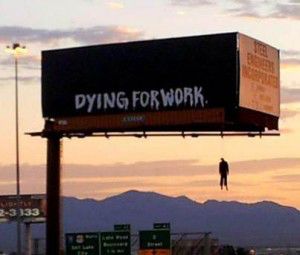A special POVERTY AWARENESS MONTH series |
|
|
|

Las Vegas billboard in 2012. Photo courtesy of www.lasvegasworldnews.com/Facebook
Let me tell you a couple stories set in 2011. Most people at some point go to Vegas and when you go, you go to the Las Vegas Strip, to see a show, to have a good time, to nice restaurants and good bars. Well, three miles away from the Las Vegas Strip is a really gritty poor part of town called North Las Vegas. It has all of the problems of poverty.
I went there to the largest high school in town, Rancho High School. It’s got about 2,500 students and I met the principal. I was trying to find out about his student body and a few minutes into our conversation he said “Who you really need to talk to is Angela, our homeless counselor.” I did a double-take.
I’ve been to many schools and usually the principals say “Hey, you should meet our history teachers. They’re doing some really interesting curriculum work.” or “You should meet our art teacher, she’s got a fabulous studio.” I’ve never had a principal say to me “You should meet our full-time homeless counselor.”
So I talked to this counselor, Angela, who said to me “In 2008, when the crisis hit, Las Vegas was hit really hard. It lost a lot of jobs, and lots of the people who had had those jobs wound up homeless. In 2008, we had about 25 homeless students in the school. The next year we had about 50 or 60. in 2010, we had over 100.”
When I went to that school in 2011 they had somewhere in the region of 200 homeless students. These were kids living in garages and in church basements. They were kids, in some cases, literally living on the streets. And they had nowhere to do their homework, nowhere to eat dinner at night, even if their families had food for them, and they had nowhere to call their own safe space. I thought “How on earth are those kids being given a fair chance? How are they being given a fair shot at a decent life?”
The second story is 3,000 miles away – right here in Pennsylvania. I went to a small town in Appalachian Pennsylvania in the winter of that year to a community center where I met a middle-aged women named Lou Ann. Prior to the recession she had been an accountant and considered herself solidly middle-class. She earned good money, had a retirement account, savings, and the psychology of a member of the Middle Class.
But then the recession hit and Lou Ann lost her job. She looked for work everywhere but she couldn’t find another job. She ran through her savings, tapped out her retirement account, went onto food stamps, and let every bill that she could slide. She almost lost her home.
When I met her in 2011, she had finally found another job. She was working at the community center, earning roughly 1/3 of what she had previously earned and she was going hungry. The only saving grace was there was a small food pantry attached to the center so every so often Lou Ann would get a free bag of food. It’s that bag of food that kept her and her children from going to bed at night hungry some nights.
A new Gilded Age
All over the country, one can encounter stories like that: men, women, and children who have run afoul of these extraordinarily destructive economic forces. People have become increasingly vulnerable – not just since 2008 but over the last decades ndash; to lack of health care access, lack of pensions, casual-ized work conditions, and scandalously low wages.
These men, women, and children are at the wrong end of a tremendously destructive transformation of the way the economy functions around inequality. Because the story of American Poverty isn’t the story of natural disaster. It isn’t the story of forces that are mysterious and beyond our control. It is intimately tied to the stampede toward inequality, or in less charitable terms, towards oligarchy.
If you are at the top of the economy, as Thomas Pilketty details in his best-selling book “Capital,” you’re doing fabulously well. If you’re in that top 1% or top .1%, year in and year out for the last four decades your share of the pie has grown. You’re getting wealthier. Your income on an annual basis is growing. Your accumulation of wealth has grown. Your tax burden has gone down. Your political influence has increased.
On the flip side of that, if you are in the bottom 20-40% of the economy you’re falling ever further down that ladder. Your share in wealth is declining.
In Pittsburgh, you know all about the Gilded Age because some of the biggest robber barons in this country came out of Pittsburgh in the late 19th Century.
We’re living in a new Gilded Age today, where for those who have, times have rarely if ever been so good in this country. For those who haven’t, times have rarely if ever been so vulnerable.
A special POVERTY AWARENESS MONTH series |
|
|
|




No comments yet.